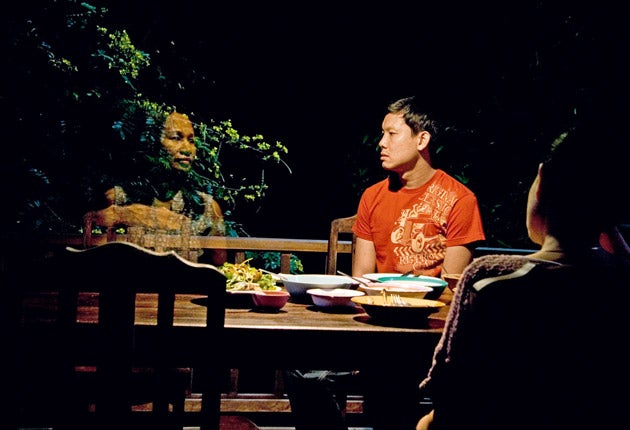Uncle Boonmee Who Can Recall His Past Lives, Apichatpong Weerasethakul, 113 mins (12A)
This year's winner at Cannes has one foot in this world, and the other somewhere else altogether

Your support helps us to tell the story
From reproductive rights to climate change to Big Tech, The Independent is on the ground when the story is developing. Whether it's investigating the financials of Elon Musk's pro-Trump PAC or producing our latest documentary, 'The A Word', which shines a light on the American women fighting for reproductive rights, we know how important it is to parse out the facts from the messaging.
At such a critical moment in US history, we need reporters on the ground. Your donation allows us to keep sending journalists to speak to both sides of the story.
The Independent is trusted by Americans across the entire political spectrum. And unlike many other quality news outlets, we choose not to lock Americans out of our reporting and analysis with paywalls. We believe quality journalism should be available to everyone, paid for by those who can afford it.
Your support makes all the difference.You'll see on its poster that the new Thai film Uncle Boonmee Who Can Recall His Past Lives has been given a 12A certificate, as it "contains one scene of moderate sex". What this actually means is sex between a woman and a catfish – a talking catfish, at that.
This might not be cinema's usual idea of "moderate", but it passes as normal in the hallucinatory world of director Apichatpong Weerasethakul. Apichatpong's vision is intensely strange – gentle, otherworldly – but with one foot in the metaphysical and the other planted firmly in the real.
Like Apichatpong's last film Syndromes and a Century, Uncle Boonmee, which won the Palme d'Or in Cannes this year, is underwritten by a belief in the possibility of reincarnation – if only as a fictional device. The body of the film – after an enigmatic prelude featuring a runaway buffalo – involves Jen (Jenjira Pongpas), an elderly woman who goes with a young male friend or relative, Tong (Sakda Kaewbuadee), to visit her brother Boonmee (Thanapat Saisaymar), a farmer with life-threatening kidney problems.
Over dinner one night, Boonmee's party has two unexpected guests. First his dead wife materialises at table to make affable chat, then along comes their long-lost son Boonsong, who had disappeared while searching for the area's fabled monkey ghosts. It turns out that Boonsong has metamorphosed into a monkey ghost himself – a shaggy black creature with glowing red eyes, resembling a rather sheepish cousin of Chewbacca in Star Wars. The assembled company is surprised, rather than scared, to see him. "Why did you grow your hair so long?" Jen asks him – an example of Apichatpong's goofy but discreet humour.
Meanwhile, deep in the nearby forest, a sorrowful princess encounters a catfish, who cheerfully consoles her by splashing about energetically under her skirts. This episode, a sort of fishy variant of Leda and the Swan, is filmed so as to evoke bygone Thai cinema. It has little apparent bearing on the main story, but illuminates Apichatpong's singular way of handling time. The princess's tale may be happening at the same time as Boonmee's, or in the distant past, or perhaps in a past that's suspended, ghost-like, in the present – all times co-existing in the jungle of fictions that this film imagines.
Later, there are other, equally disconcerting time jumps. Boonmee and guests explore a network of caves where he recalls being born and where, it seems, he is ready to confront death. There he recounts a dream – with echoes of Chris Marker's classic sci-fi parable La Jetée – about a dystopian future in which tyrannical authorities zap visiting time travellers with a machine that destroys them by projecting their images – a baleful metaphor, apparently, for cinema itself. But the images Apichatpong projects on screen bear little obvious relation to Boonmee's dream: a series of still photos of young Thai soldiers larking around, sometimes with another man-ape hybrid. Seemingly documentary, distinctly homoerotic, these pictures suggest, if anything, a Thai Larry Clark.
The film ends on an equally oblique episode, a simple but dazzling coup de cinéma that solves the problem of how you might go out for dinner – and stay in watching TV at the same time. The effect is unashamedly low-tech, yet jaw-droppingly entrancing, the magic boosted by the film's closing music, a piece of cheesy but euphoric Thai pop.
But there's more at work here than spooky good vibes. There's a political element that will bewilder non-Thai viewers. I wish I knew, for example, the exact nature of the images, seemingly of local unrest, that flash on a TV screen at the end. Also significant is Jen's prejudice towards the Laotian immigrants who work on Boonmee's farm. And the film is set in an area of north-east Thailand where the government in the 1960s ran a campaign to suppress communists. In fact, Boonmee blames his kidney troubles on bad karma as a result of killing communists in his youth.
Furthermore, we might be tempted to imagine that Apichatpong's use of myth and mysticism is folksy, old-world, typically Thai; in fact, a resident of Bangkok once told me, "Here, we don't consider Apichatpong very Thai." We shouldn't mistake Apichatpong's true nature as a hyper-sophisticated modernist with complex, innovative ideas about time and narrative. It would misrepresent Uncle Boonmee to depict it merely as dream-like, or as a warm bath of beatific strangeness. That said, if you're looking for real magic in the cinema this week, you won't find it in the industrial gimcrackery of the new Harry Potter episode, but here, in the dense, bewitching foliage of Apichatpong's imagination.
Next Week:
Jonathan Romney sees George Clooney play spy games in The American
Join our commenting forum
Join thought-provoking conversations, follow other Independent readers and see their replies
Comments